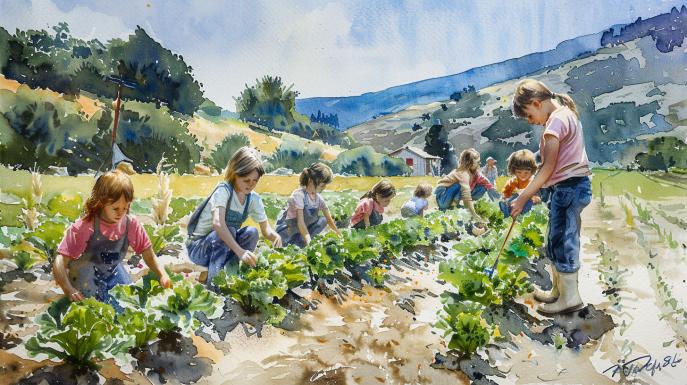No alvorecer de um novo dia para o nosso planeta, a agricultura sustentável desponta como uma estrela-guia rumo a um futuro mais próspero e equilibrado.
Mas afinal, quais são os alicerces desse movimento que renova a esperança de uma harmonia possível entre homem e natureza? Este guia é o seu mapa para um terreno fértil de conhecimento, onde princípios como o manejo sustentável do solo, práticas de cultivo inovadoras e o uso eficiente de água na agricultura se entrelaçam, criando um ciclo virtuoso de vida. Juntos, vamos semear ideias e colher não apenas alimentos, mas também soluções para um futuro sustentável.
What is the basis of sustainable agriculture and how does it contribute to a better future?
The fundamental principles of sustainable agriculture involve cultivation practices that ensure food production while preserving the environment, supporting economic and social equity. Sustainable farming practices, such as crop rotation and organic farming, benefit pest control and soil health, directly improving environmental health. Sustainable soil management and efficient use of water in agriculture, including drip irrigation and cover crops, contribute to the conservation of water and soil resources and are crucial to the long-term sustainability of the agricultural sector.
What are the best practices and technologies that promote sustainable agriculture?
Agroforestry systems stimulate biodiversity and soil through the symbiotic interaction between trees and agricultural crops or pastures, which enhances the health of the ecosystem. The implementation of these systems enriches soil vitality and increases biological diversity. Furthermore, low-carbon agriculture aims to minimize greenhouse gas emissions by using management practices that optimize the use of natural resources. This includes, for example, the use of cover crops and crop rotation to improve carbon sequestration in the soil. In terms of technological advances, from precision sensors to smart irrigation systems, technology in sustainable agriculture is enabling more effective and efficient practices that reduce resource waste and maximize agricultural production with less environmental impact.
What are the challenges and benefits of the transition to sustainable agriculture?
The transition to sustainable agricultural practices faces several challenges, such as the need for initial investments and the adoption of new knowledge by farmers. Additionally, changes in consumer behavior are required to validate these methods in the market. However, the economic and social benefits are palpable, including long-term cost savings, consistent and climate-resilient yields, as well as promoting social equity and supporting farmworker rights. Case studies, such as those presented in conservation programs, prove the feasibility and success of implementing sustainable practices, providing practical examples of how biodiversity, soil and water quality are improved, resulting in reduced erosion and increased sequestration of carbon.
How does sustainability in agriculture affect consumption and society in general?
Organic products affect the current market by creating demand for food from cultivation methods that preserve the health of the soil, ecosystem and consumers. Its certification ensures that organic standards are maintained, which influences consumer expectations and defines market practices. The circular economy in agriculture is applied through waste recycling and the use of closed nutrient cycles, maximizing resource efficiency and minimizing waste. Sustainable agriculture inspires conscious consumption by encouraging choices that support ecologically correct and ethically sound agricultural practices, thus promoting more balanced and fair social development. To better understand organic product labeling, it's helpful to explore the guidelines established by the USDA.
In this article, we explore the foundations of sustainable agriculture and its crucial role in nurturing a promising future. We analyze growing practices that respect the environment, responsible soil management techniques and the importance of efficient water use. We immersed ourselves in best practices and emerging technologies, such as agroforestry systems and low-carbon agriculture, which combine productivity and environmental conservation. We faced the challenges of transitioning to sustainable methods, but we also saw the tangible benefits, which were illustrated through case studies. Finally, we reflect on the impact of sustainability in the agricultural sector on consumption patterns and social structure. Sustainable agriculture is not just a choice, but an imperative for the health of our planet and the well-being of future generations.
FAQ: Sustainable Agriculture and Its Impact on the Future
1. What is sustainable agriculture and how does it contribute to the environment?
Sustainable agriculture incorporates farming practices that not only produce food but also preserve natural resources, promoting economic and social equity. Practices such as crop rotation and organic farming help control pests and improve soil health, which benefits the environment. Efficient water and soil management practices, such as drip irrigation and cover crops, are essential for the long-term conservation of these resources.
2. What technologies are used to promote sustainable agriculture?
Technologies that promote sustainable agriculture include agroforestry, which improves soil health and biodiversity, and low-carbon agriculture, which aims to reduce greenhouse gas emissions. Furthermore, the use of precision sensors and smart irrigation systems allows for more effective agricultural practices that minimize waste of resources and enhance production with less environmental damage.
3. What are the challenges of adopting sustainable agricultural practices?
Challenges linked to the adoption of sustainable agricultural practices include the initial investment cost, the need for new knowledge on the part of farmers and the change in consumption habits to sustain these methods in the market. However, the benefits are significant, including long-term cost savings, resilient incomes and the promotion of social equity and workers' rights.
4. How does sustainability in agriculture influence consumption and society?
Sustainable agriculture encourages more conscious and responsible consumption, generating demand for products grown in a way that preserves the health of the soil and the ecosystem. Certification of organic products ensures that standards are maintained, influencing consumer expectations and market practices. The circular economy is strengthened by waste recycling and efficient use of nutrients, idealizing a more equitable and fair society.
5. How can I ensure I am purchasing truly organic products?
In order to ensure the authenticity of organic products, it is important to understand the guidelines and certification established by official bodies such as the USDA. Check labels to ensure products comply with organic standards.
These questions are a starting point into the wonderful world of sustainable agriculture – an important step towards a greener and fairer future for us all. Explore, question and join the conversation about how we can nourish not only our bodies, but also our planet.

